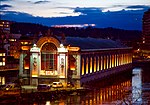The Bâtiment des Forces motrices (BFM), French for "Power plant building", is the power house of a former hydro power plant and waterworks in Geneva called Usine des Forces Motrices, later Usine des Forces Motrices de la Coulouvrenière.
The structure is positioned near the point where the River Rhône flows out of Lake Geneva towards Lyon. It was created between 1883 and 1892 (and subjected to subsequent improvements) to exploit the flow of the river to provide water pressure to feed the city's water supply and a hydraulic power network. Furthermore, the weir of the structure was designed to regulate the level of the lake. The structure lost its original function as a power source in 1963, but it nevertheless continued to house pumping equipment to service Geneva's drinking water supply till 1988. The weir of the power plant was used some more years till it was taken over by the Barrage du Seujet (Seujet barrage) in 1995, which is located approximately fifty meters downstream from the BFM. Towards the end of the twentieth century the BFM was converted into an entertainment venue, reopening in 1997 as an opera house / concert hall designed by the architect Bernard Picenni in association with the acoustician Peutz and the scenographer dUCKS scéno.
At the time when the project was defined as a "power plant" there was no automatic correlation between a "power plant" and a public electricity supply. The idea in 1882 was to feed power in the form of pressurized water to local manufacturing businesses, who could use it to operate their own powered machinery, which might indeed include generators. Another objective involved using the pumped water to feed the reservoirs of the public drinking water supply. However, in 1887 electricity generation started in a building nearby the BFM, where generators were driven by pressurized water supplied from the BFM. The hydraulic power network needed a pressure valve to avoid the damage from excessive pressure within the network which was located beside the BFM and which was the precursor to Geneva's Jet d'Eau (fountain).







